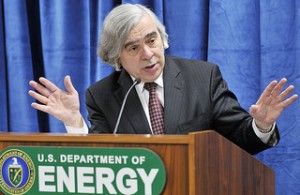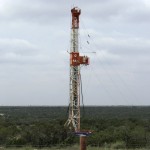Energy Secretary Moniz Comments On Proposed Denton Fracking Ban (Sort Of)

PHOTO CREDIT: DOE PHOTOGRAPHER, KEN SHIPP
Ernest Moniz was the keynote speaker of this year's SXSW Eco conference in Austin.
It’s not every day that you get to talk to the US Secretary of Energy about how the oil and gas boom affected your hometown. So, when Alyssa Wolverton saw her chance, she took it.
After delivering the keynote speech at this year’s SXSW Eco conference, Department of Energy Secretary Ernest Moniz took some questions from the audience. That’s when Wolverton, a student at the University of North Texas in Denton, asked him about a proposal to ban hydraulic fracturing (or “fracking”) within city limits. The town will be voting on the ban this November.
“I was curious to know if you think that your really good idea of diversifying our energy (…) can mesh up with the integrity of our cities that don’t want more advances,” asked Wolverton, who supports the proposed ban.
Moniz didn’t speak specifically to the situation in Denton, but he agreed that some parts of the country can prohibit fracking.
“I think different cities, different states will take different approaches clearly. But fundamentally it is a large industrial activity and you cant kind of make that go away,” he said. “What you can do is try to minimize the footprint, and then decisions clearly are taken at various political levels at different parts of the country,” he added.
In fact, parts of the country have already “banned” or severely restricted fracking. New York state has a moratorium on the the practice, and the state’s supreme court there ruled this year that towns could ban it in local ordinance.Whether the state of Texas will allow a local ban is another question. Outgoing Texas Land Commissioner Jerry Patterson has said the state would pursue “any available remedy” to counter the ban. Other Texas politicians have publicly opposed the ban as well.
And what did Wolverton think of Moniz’ reply? .
“He gave sort of a broad answer which is what you normally give when you’re put on the spot,” she told StateImpact Texas after the event. But she said liked hearing Moniz refer to hydraulic fracturing as a “large industrial activity,” and she was happy with the answer.
“Is it possible to say no to that industry? I don’t know if it is, and I think the federal government could help us say no,” she said.

